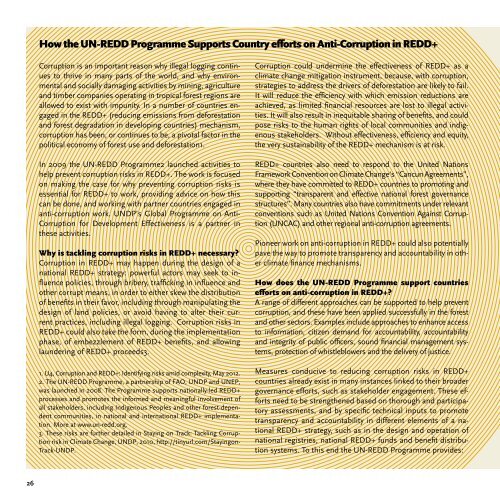Green Carbon, Black Trade - UNEP
Green Carbon, Black Trade - UNEP
Green Carbon, Black Trade - UNEP
Create successful ePaper yourself
Turn your PDF publications into a flip-book with our unique Google optimized e-Paper software.
How the UN-REDD Programme Supports Country efforts on Anti-Corruption in REDD+<br />
Corruption is an important reason why illegal logging continues<br />
to thrive in many parts of the world, and why environmental<br />
and socially damaging activities by mining, agriculture<br />
and timber companies operating in tropical forest regions are<br />
allowed to exist with impunity. In a number of countries engaged<br />
in the REDD+ (reducing emissions from deforestation<br />
and forest degradation in developing countries) mechanism,<br />
corruption has been, or continues to be, a pivotal factor in the<br />
political economy of forest use and deforestation1.<br />
In 2009 the UN-REDD Programme2 launched activities to<br />
help prevent corruption risks in REDD+. The work is focused<br />
on making the case for why preventing corruption risks is<br />
essential for REDD+ to work, providing advice on how this<br />
can be done, and working with partner countries engaged in<br />
anti-corruption work. UNDP’s Global Programme on Anti-<br />
Corruption for Development Effectiveness is a partner in<br />
these activities.<br />
Why is tackling corruption risks in REDD+ necessary?<br />
Corruption in REDD+ may happen during the design of a<br />
national REDD+ strategy: powerful actors may seek to influence<br />
policies, through bribery, trafficking in influence and<br />
other corrupt means, in order to either skew the distribution<br />
of benefits in their favor, including through manipulating the<br />
design of land policies, or avoid having to alter their current<br />
practices, including illegal logging. Corruption risks in<br />
REDD+ could also take the form, during the implementation<br />
phase, of embezzlement of REDD+ benefits, and allowing<br />
laundering of REDD+ proceeds3.<br />
1. U4, Corruption and REDD+: Identifying risks amid complexity, May 2012.<br />
2. The UN-REDD Programme, a partnership of FAO, UNDP and <strong>UNEP</strong>,<br />
was launched in 2008. The Programme supports nationally-led REDD+<br />
processes and promotes the informed and meaningful involvement of<br />
all stakeholders, including Indigenous Peoples and other forest-dependent<br />
communities, in national and international REDD+ implementation.<br />
More at www.un-redd.org.<br />
3. These risks are further detailed in Staying on Track: Tackling Corruption<br />
risk in Climate Change, UNDP, 2010, http://tinyurl.com/Stayingon-<br />
Track-UNDP.<br />
Corruption could undermine the effectiveness of REDD+ as a<br />
climate change mitigation instrument, because, with corruption,<br />
strategies to address the drivers of deforestation are likely to fail.<br />
It will reduce the efficiency with which emission reductions are<br />
achieved, as limited financial resources are lost to illegal activities.<br />
It will also result in inequitable sharing of benefits, and could<br />
pose risks to the human rights of local communities and indigenous<br />
stakeholders. Without effectiveness, efficiency and equity,<br />
the very sustainability of the REDD+ mechanism is at risk.<br />
REDD+ countries also need to respond to the United Nations<br />
Framework Convention on Climate Change‘s “Cancun Agreements”,<br />
where they have committed to REDD+ countries to promoting and<br />
supporting “transparent and effective national forest governance<br />
structures”. Many countries also have commitments under relevant<br />
conventions such as United Nations Convention Against Corruption<br />
(UNCAC) and other regional anti-corruption agreements.<br />
Pioneer work on anti-corruption in REDD+ could also potentially<br />
pave the way to promote transparency and accountability in other<br />
climate finance mechanisms.<br />
How does the UN-REDD Programme support countries<br />
efforts on anti-corruption in REDD+?<br />
A range of different approaches can be supported to help prevent<br />
corruption, and these have been applied successfully in the forest<br />
and other sectors. Examples include approaches to enhance access<br />
to information, citizen demand for accountability, accountability<br />
and integrity of public officers, sound financial management systems,<br />
protection of whistleblowers and the delivery of justice.<br />
Measures conducive to reducing corruption risks in REDD+<br />
countries already exist in many instances linked to their broader<br />
governance efforts, such as stakeholder engagement. These efforts<br />
need to be strengthened based on thorough and participatory<br />
assessments, and by specific technical inputs to promote<br />
transparency and accountability in different elements of a national<br />
REDD+ strategy, such as in the design and operation of<br />
national registries, national REDD+ funds and benefit distribution<br />
systems. To this end the UN-REDD Programme provides:<br />
26
















